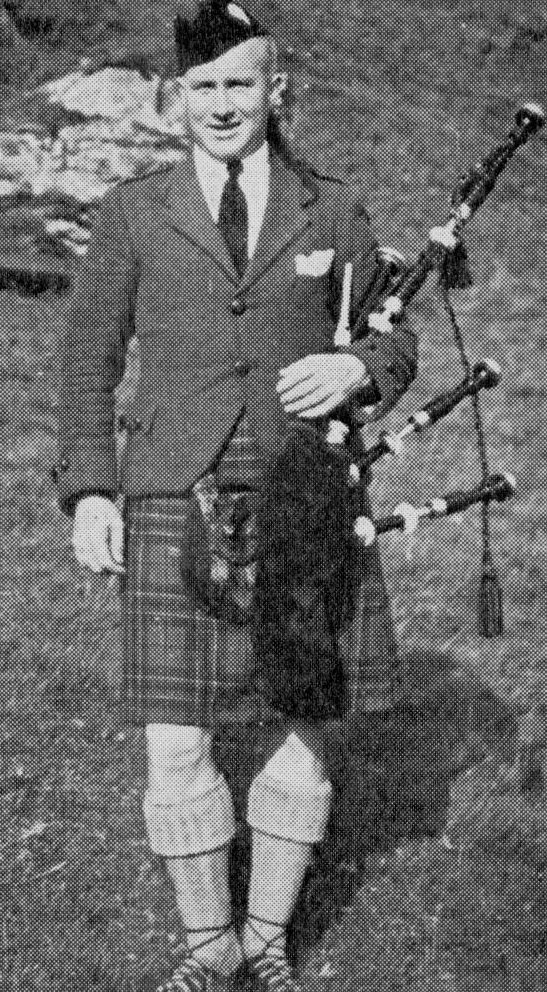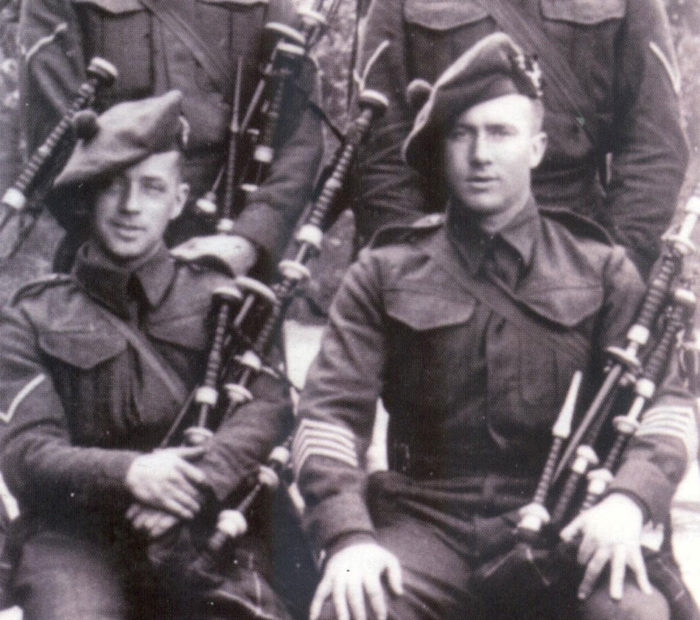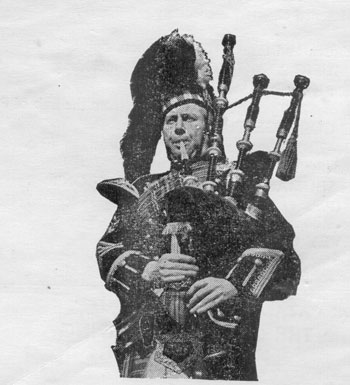Donald MacLean
-Pipe Major- (1908-1964)
 This larger-than-life piping character was known variously as “Big Donald MacLean” and “Donald MacLean of Lewis,” as recalled in Donald MacLeod’s popular 6/8 march. References in piping books to “Pipe Major Donald MacLean” are generally to him.
This larger-than-life piping character was known variously as “Big Donald MacLean” and “Donald MacLean of Lewis,” as recalled in Donald MacLeod’s popular 6/8 march. References in piping books to “Pipe Major Donald MacLean” are generally to him.
Born in 1908, his interest in the pipes began in 1916 when his older brother Murdo took up the instrument to help in the recovery of a lung wound suffered in the Great War. Donald borrowed his brother’s chanter and soon both were being taught by Peter Stewart of Barabhas.
He joined the Seaforth Highlanders at age 18 in 1926 and was posted to Aldershot, where he came under the strong influence of Pipe Major, D. R. MacLennan, half-brother of the famous G. S. In 1931, while a Corporal with the 1st Seaforths, he earned his Pipe Major’s Standard Certificate at the Army School of Piping under Willie Ross and became pipe major of the 2nd Battalion Seaforths in 1936 – the youngest pipe major in the British army at that time. His piping pedigree would also include piobaireachd studies with Angus MacPherson, son of Calum Piobaire. Donald MacLeod started him on piobaireachd during the war as a way to strengthen his fingers for light music playing. Big Donald became later became particularly well known as a march player.

On June 12, 1940, he, along with the likes of Donald MacLeod, John Wilson, George McIntyre and many other pipers in the 51st Highland Division, were captured in France at St. Valery. He would spend the next five years as a prisoner of war in Germany and Poland. It was during this time that he wrote his famous competition march “Major David Manson at Clachantrushal” on a practice chanter borrowed from fellow piper Alex Craig. David Manson was a retired officer of the Canadian army who worked as a Glasgow silversmith. He had visited Donald’s home before the war and gave him a set of engraved silver pipes. “Clachantrushal” refers to a monolith – said to be the largest standing stone in Scotland – that stands near the home.
At war’s end he took over the Scottish Command School of Piping, then moved to the Highland Brigade training school, finally retiring from the army in 1948 after 22 years. Though he was famous in military piping circles, he was little known outside of that realm. This changed dramatically in the years following the war. As Seumas MacNeill wrote in his 1964Piping Times obituary of Donald MacLean, “Those of us who had heard of him only vaguely were amazed to find that he was a piper of the very first rank.”
“It is probably true to say that many of the competitions following the cessation of hostilities were completely dominated by Pipe Major Donald MacLean.”
He was renowned for his powerful fingers and robust instrument, which only he could blow. MacNeill again: “His instrument was a legend itself and few pipers could blow it. Those who did were never quite the same afterwards.”
He won the Gold Medal at Oban in 1951 with “MacDonald’s Salute” and at Inverness in 1953 with “Black Donald’s March,” and later become a regular adjudicator at the games and major gatherings. In 1954 he visited Canada with dance-band accordionist Bobby MacLeod at the request of the B.C. Pipers’ Association and was a huge success.
 He was an excellent Highland dancer, and he taught piping and dancing in Skye for some years before being offered the job of managing instruments at the R. G. Lawrie company in Glasgow. Ads for this company during the 1950s and 1960s feature Donald MacLean’s iconic photo, unmistakable because he played with his right hand on top. If there was a ‘Best Dressed Piper’ award at a games he attended, he usually won it.
He was an excellent Highland dancer, and he taught piping and dancing in Skye for some years before being offered the job of managing instruments at the R. G. Lawrie company in Glasgow. Ads for this company during the 1950s and 1960s feature Donald MacLean’s iconic photo, unmistakable because he played with his right hand on top. If there was a ‘Best Dressed Piper’ award at a games he attended, he usually won it.
On August 29, 1964, after attending the Cowal games, he collapsed on the street in the town of Innellan near Dunoon. Resuscitation efforts failed and he died before the ambulance arrived. He was 56.
“By any account, Donald MacLean was an eccentric,” wrote Seumas MacNeill in 1964, “but he was one of the kindest gentlemen who ever graced the piping scene.”
“His humour was quick, but never hurtful, his advice was tactfully given, and he was generous almost to a fault. We who knew him and laughed with him and loved him will always be glad that his last performance was a really good one.”
His most famous pupil was Hector MacFadyen, Pennyghael, who won both Gold Medals in 1964, within a month after Big Donald MacLean died.
JM, May 2009
-with notes from the Piping Times, September 1964, June 2002, March 2009, ‘The Piper and Dancer Bulletin’, October 1964.

6 Comments
Studying The tune Pipe Major Donald McClean if Lewis for my first Grade 5 competition. I’m 57 yrs old. I was 2 years old when he passed. Impressive history.
Donald McLean was my father’s cousin and was often at my grandparent’s house in Fort William.
He often played his favourite tunes in my grandmother’s lounge and was full of fun especially with us children. He also liked a few drams!
My instructor taught me this tune in the late summer of 2020. I competed with it in a “virtual” online competition. I didn’t win or place in this in this particular video. I did win a medal with it, not this video, but in another competition. I am an adult piper and learning. Here is the link if anyone wants to watch it. I think I am playing it better now. Needs more work. This is a wonderful tune and I can somehow feel the great friendship Donald MacLeod had for his friend. Thanks. M. https://www.youtube.com/watch?v=6BDxfuzkOSQ
Donald MacLean is my great uncle. I dad is Ian Gilbert MacLean named after Donald’s brother
My name is Donald Murdo Maclean Young, I see my Aunt Jean has posted above and like her i’m digging into our family history and would love to hear from any distant family as we build more detail into our family tree
Donald made a great impression on me though I knew him for just the two years before his death in 1964. He was the pipe major of a scratch band of Territorial Army pipers who played in relays over the Christmas season for the pantomine in Glasgow’s Alhambra Theatre. Seumas MacNeill’s comment above made me giggle: “His instrument was a legend itself and few pipers could blow it. Those who did were never quite the same afterwards.” Donald asked me to warm up his pipes and tune them in the lane beside the Alhambra. It was a beautiful instrument to play, and not hard, but the bag seemed to have been the skin of a very big sheep indeed. All the kind things said about him above ring true: a kind, friendly, humorous man and a great piper. In the gap between theatre performances he taught “Black Donald’s March” to my friend Ronnie Buchanan and me from the Glasgow Uni Band.